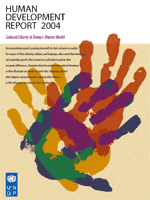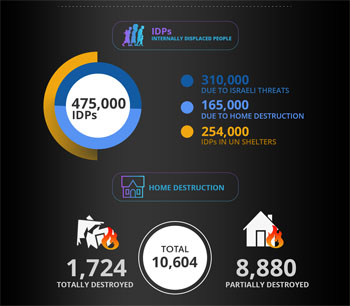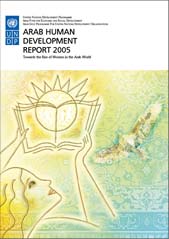Human Development Report 2004
Cultural Liberty in Today’s Diverse World
Accommodating people’s growing demands for their inclusion in society, for respect of their ethnicity, religion, and language, takes more than democracy and equitable growth. Also needed are multicultural policies that recognize differences, champion diversity and promote cultural freedoms, so that all people can choose to speak their language, practice their religion, and participate in shaping their culture—so that all people can choose to be who they are.
Foreword
At a time when the notion of a global “clash of cultures” is resonating so powerfully—and worryingly—around the world, finding answers to the old questions of how best to manage and mitigate conflict over language, religion, culture and ethnicity has taken on renewed importance. For development practitioners this is not an abstract question. If the world is to reach the Millennium Development Goals and ultimately eradicate poverty, it must first successfully confront the challenge of how to build inclusive, culturally diverse societies. Not just because doing so successfully is a precondition for countries to focus properly on other priorities of economic growth, health and education for all citizens. But because allowing people full cultural expression is an important development end in itself.
Human development is first and foremost about allowing people to lead the kind of life they choose—and providing them with the tools and opportunities to make those choices. In recent years Human Development Report has argued strongly that this is as much a question of politics as economics—from protecting human rights to deepening democracy. Unless people who are poor and marginalized—who more often than not are members of religious or ethnic minorities or migrants—can influence political action at local and national levels, they are unlikely to get equitable access to jobs, schools, hospitals, justice, security and other basic services.
This year’s Report builds on that analysis, by carefully examining—and rejecting—claims that cultural differences necessarily lead to social, economic and political conflict or that inherent cultural rights should supersede political and economic ones. Instead, it provides a powerful argument for finding ways to “delight in our differences”, as Archbishop Desmond Tutu has put it. It also offers some concrete ideas on what it means in practice to build and manage the politics of identity and culture in a manner consistent with the bedrock principles of human development.
Sometimes, that is relatively easy—for example, a girl’s right to an education will always trump her father’s claim to a cultural right to forbid her schooling for religious or other reasons. But the question can get much more complicated. Take education in the mother tongue. There is persuasive evidence that young children are more successful learning in their own language. However, what is an advantage at one point in life—and indeed may remain an indispensable bedrock of identity throughout life—can turn into a disadvantage in other ways when lack of proficiency in more widely used national or international languages can severely handicap employment opportunities. As this Report makes clear, from affirmative action to the role of the media, there are no easy—or one size fits all—rules for how best to build working multicultural societies.
Even so, one overarching lesson is clear: succeeding is not simply a question of legislative and policy changes, necessary though they be. Constitutions and legislation that provide protections and guarantees for minorities, indigenous people and other groups are a critical foundation for broader freedoms. But unless the political culture also changes—unless citizens come to think, feel and act in ways that genuinely accommodate the needs and aspirations of others—real change will not happen.
When the political culture does not change, the consequences are disturbingly clear. From disaffected indigenous groups across Latin America, to unhappy minorities in Africa and Asia, to new immigrants across the developed world, failing to address the grievances of marginalized groups does not just create injustice. It builds real problems for the future: unemployed, disaffected youth, angry with the status quo and demanding change, often violently.
That is the challenge. But there are also real opportunities. The overarching message of this Report is to highlight the vast potential of building a more peaceful, prosperous world by bringing issues of culture to the mainstream of development thinking and practice. Not to substitute for more traditional priorities that will remain our bread and butter—but to complement and strengthen them. The flip side of the development divide is that developing countries are often able to draw on richer, more diverse cultural traditions—whether captured in language, art, music or other forms— than their wealthier counterparts in the North. The globalization of mass culture—from books to films to television—clearly poses some significant threats to these traditional cultures. But it also opens up opportunities, from the narrow sense of disadvantaged groups like Australian Aborigines or Arctic Inuit tapping global art markets, to the broader one of creating more vibrant, creative, exciting societies.
Like all Human Development Reports, this is an independent study intended to stimulate debate and discussion around an important issue, not a statement of United Nations or UNDP policy. However, by taking up an issue often neglected by development economists and putting it firmly within the spectrum of priorities in building better, more fulfilled lives, it presents important arguments for UNDP and its partners to consider and act on in their broader work. This year, I would also like to pay particular tribute to Sakiko Fukuda-Parr, who is stepping down after 10 successful years leading our Human Development Report Office. I would also like to extend special thanks to Amartya Sen, one of the godfathers of human development, who has not only contributed the first chapter but been an enormous influence in shaping our thinking on this important issue.
Mark Malloch Brown
Administrator, UNDP







